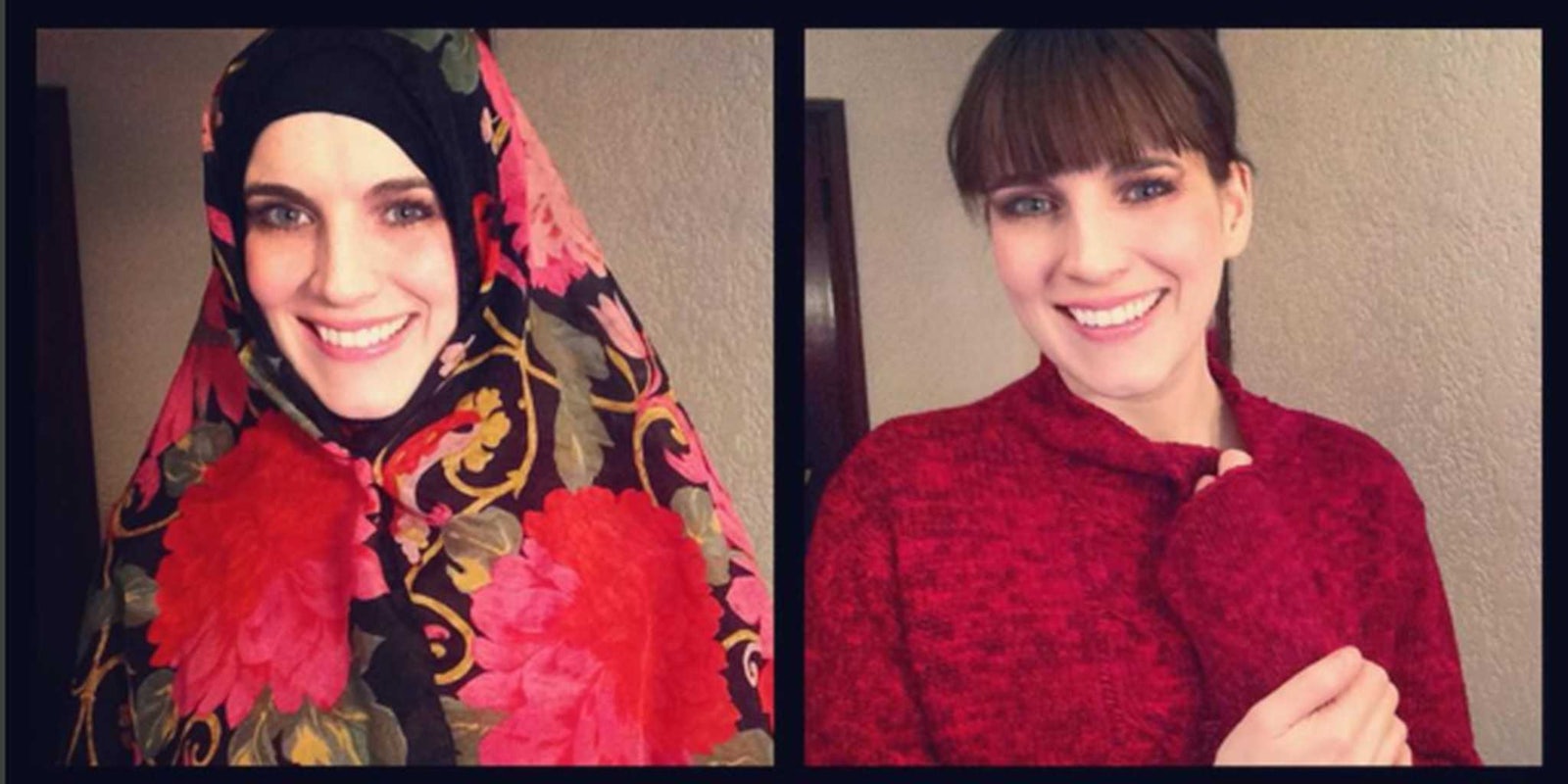One woman’s social experiment is another’s highly offensive nightmare. This is evident in a video made by a Canadian comedienne and vlogger where she created two different Tinder profiles—one in which she’s wearing a hijab (a traditional Muslim head covering for women), and one where she’s not. She’s trying to make a point about the way in which Muslims are treated differently based on their looks, but is she completely misguided?
In the video posted on Jan. 12, the woman, who goes by the name Davison on social media, donned a hijab of her own making. It makes her look less like a traditional Muslim woman and more like the matchmaker from Fiddler on the Roof. Yet she seems convinced that despite her light complexion and amateur hijab, she can fool men on Tinder in the Montreal area that she is a practicing Muslim and from there can draw assumptions about how they would treat any woman like her.
In the video description, Davison writes “The test: how many matches does a woman dressed as a Muslim get compared to an implied Christian woman?”
https://www.youtube.com/watch?v=v_IRwma2Gqc
After hundreds of swipes and matches, the data shows that “Christian Sara” was much more sought after on Tinder than “Muslim Sara.” At the end of the video, we learn that Davison’s “Muslim” profile was reported to Tinder and “under review,” which she believes is a product of the hijab (and not because people recognize it as a fake profile). She reached out to Tinder to have it reinstated, but has so far been unsuccessful. Davison has not returned the Daily Dot’s request for comment.
The Daily Dot asked Maysoon Zayid—a comedian, writer, and co-founder and co-executive producer of the New York Arab-American Comedy Festival—how she felt about Davison’s experiment. Her initial reaction? “This is highly offensive.”
Zayid mused whether Davison would have dared to create a Tinder profile in which she’s wearing blackface and one where she’s not. The Internet has been exposed to plenty of ignorant people wearing blackface to make a point and this comparison illustrates just how offensive wearing a faux-hijab can be. She called Davison’s hijab “cartoonish,” adding, “she needs to check her privilege and find another hobby.”
This is hardly the first a person has used the hijab as a means to gauge people’s feelings towards Muslims. A Google video search for “hijab experiment” turns up thousands of results: Some of them feature actual Muslim women seeing how people react to them with and without a hijab.
Others, however, feature white women like Davison, trying to make a point about the way women in hijabs are treated. In 2013, a young white woman named Katie Tully made a video in which she describes her plan to wear a hijab at school.
“I’m not Muslim by any means, but for the spring semester, I’ve decided to do a social experiment,” Tully told the camera. “I will be going to a heavily LDS-populated school at an undisclosed location and I’ve decided that for the entire spring semester, I’m going to be wearing a hijab.”
What followed was months of videos documenting Tully’s journey wearing a hijab. In one of her first videos, she reveals that she’s even wearing her cross under the hijab (perhaps as a way to make herself feel better.)
A late-December story in the Washington Post written by former Muslim journalists Asra Q. Nomani and Hala Arafa provided a bit more insight into why exactly it’s so offensive for a non-Muslim to wear a hijab. They write in the piece that “as Muslim women, we actually ask you not to wear the hijab in the name of interfaith solidarity,” explaining that a hijab is symbolic of the “well-financed effort by conservative Muslims to dominate modern Muslim societies.” By wearing a hijab and participating in events like #WorldHijabDay (during which non-Muslims wear the head coverings), they believe people are only further reinforcing that point of view.
In the wake of terrorist attacks both in the U.S. and abroad, anti-Muslim sentiment has reached a fever pitch (thanks in no small part to Republican presidential candidates.) But Davison and others’ videos serve as reminders that cultural appropriation does not equate to activism. There are certainly better ways to be allies.
Update, 12:28pm CT, Jan. 15: Davison responded to the Daily Dot in an email:
I have not received any feedback from muslim women. I researched how to wear an underscarf and obtained one to properly wear my hijab. There are many ways to wear the scarves of hijabs, to my understanding. Tinder never messaged me back.
Photo via Davisonvideo/Instagram


